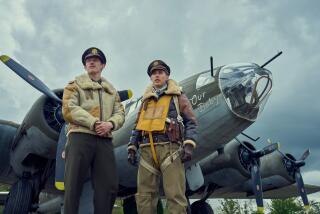BOOK REVIEW : The Reality and Psychology of Terrorism : FLYING HERO CLASS <i> By Thomas Keneally</i> ; Warner $19.95, 289 pages
- Share via
Gone are the Cold War days when you could pick up a thriller and know that you would find a fast-paced, complex plot full of espionage, adventure, violence, manly men, sexy women and edge-of-the-seat suspense.
That was the heyday of Ian Fleming’s James Bond novels (which the Soviet KGB took so seriously that they commissioned Bulgarian novelist Andrei Gulyashi to create a Communist hero to liquidate Bond in “Avakum Zhakov Versus 07” (sic)).
Now, in the springtime of detente, Le Carre philosophizes about the inner game of spying, Ken Follett wanders off into medieval history, Frederick Forsyth and William Buckley telegraph political messages, and even Tom Clancy strays into the Novel of Ideas (as readers will see when “The Sum of All Fears” is published this summer).
All of which should prepare us for Thomas Keneally’s fascinating fictional study of the psychology of terrorism, “Flying Hero Class.” But it doesn’t.
Keneally sets up his premise quickly: Palestinian terrorists hijack a jet en route to Frankfurt from New York. Aboard is a troupe of dancers from the aboriginal Barramatjara people in Australia with their Caucasian Australian manager, Frank McCloud.
McCloud is singled out by the hijackers and paraded up the aisle of the airplane with a placard around his neck that reads “Exploiter of Landless People.” The Palestinians try to convince the aboriginals that they are on the same side by accusing McCloud of being a CIA dupe and one of the whites who stole aboriginal land for mining.
A colorful cast of passengers contributes various perspectives to this airborne seminar on Third World politics, including an attractive right-wing Japanese-American woman, a Fleet Street journalist, a Jewish-American businessman who specializes in computer software that helps Israel track terrorists, a nervous pilot and McCloud’s unhappy wife.
This exchange between a terrorist and a passenger encapsulates Keneally’s proposition:
“ ‘You do not understand us, madam?’ said Taliq. ‘It is the same as with the other passengers. We don’t seem real to you.’
“Daisy closed her eyes for a minute before opening them and staring ahead. ‘Mr. Taliq, let me say you seem real enough. You’ve got two guys kneeling in their Fruit of the Looms in the aisle. That’s real real in my book. . . .’
“ ‘Yes,’ said Taliq softly. ‘You pay attention to what we do. But you can’t understand why it’s done. ‘ “
We learn that this act of terrorism is done out of frustration and anger at the Western powers who ignore the tragic plight of the Palestinian people. In the process of teaching this lesson, Taliq and the other terrorists become very real individuals, indeed.
In less skillful hands, this premise could degenerate into a corny movie-for-TV melodrama. But Keneally turns this tightly confined story even further inward to explore the psyches of the terrorists, the psychology of their victims and the themes of personal responsibility and guilt.
The versatile and prolific author of such books as “The Chant of Jimmy Blacksmith,” “Schindler’s List” and “To Asmara” probes this dilemma thoughtfully. He reveals intriguing subtleties of national interest and complex depths of character in his engrossing dialogues.
What gets lost in the process is suspense, excitement and a sense of threat. With all the philosophical discussions, the memory flashbacks and the lengthy digressions on whose grandfather did what to whom, we stop worrying about the imperiled airline passengers. Worse, we get the feeling that Keneally has stopped worrying, too.
“Flying Hero Class” is a rich and rewarding read, but the thrill is gone.
Next: Judith Freeman reviews “The Iowa Award: The Best Short Stories From Twenty Years” (University of Iowa).
More to Read
Sign up for our Book Club newsletter
Get the latest news, events and more from the Los Angeles Times Book Club, and help us get L.A. reading and talking.
You may occasionally receive promotional content from the Los Angeles Times.







